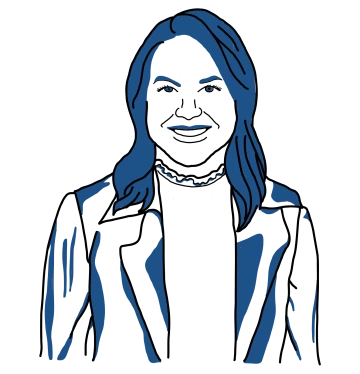Asking Alumni Experts

What hard-earned wisdom would you share with graduating seniors?
For expert advice in this issue, we turned to alumni who are successful in a variety of fields. Several of them also are accustomed to providing guidance through the University of Arizona Wildcat Mentor Society, which pairs students with accomplished graduates to ease the transition from college to career.
ANDY HARRIS ’87
Managing Director, STS Capital Partners
Operating Partner, Rosewood Private Investments

When I first graduated, I went to work for Exxon as a chemical engineer. It was the largest company in the world, and I was really just a number. It showed me the importance of culture and how important managers are to the success and happiness of workers. So my advice is: to the extent you can, pick a good manager. Remember: You’re interviewing them as much as they’re interviewing you.
I also advise finding a mentor or mentors to help shape life post-graduation. Then, networking is really important. You never know where it could lead you — great career opportunities, lifelong friends, maybe a partner or spouse. And seek to give back with networking and mentoring. It’s not just about what’s in it for you. If you’ve just graduated, you might not feel like you can add much value, but maybe you know someone and you can provide a connection or information.
Whether you’re going to graduate school or beginning a career, approach it with humility. Be really willing to serve and put everything you’ve got into it. There’s a saying that the harder you work, the luckier you get.
It’s easy to get involved in work and achieving success, but it’s also important to make sure you prioritize personal and family objectives. Hold yourself accountable or find others to support you and keep you accountable to help keep things in balance.
CORINN WILSON ’07
Admissions Manager
United World College ISAK Japan

First, be a sponge. Take everything in. You’re not expected to know everything as a recent graduate. After completing my bachelor’s degree in communications, I had many career interests and wanted to explore my options. With each job I observed and learned as much as I could. I would always ask the same questions to my manager and colleagues, “What does this do? What does that mean? What do you do? How does my role/job responsibilities fit into all this?” Asking questions and soaking up your surroundings will help reduce the pressure of “having to know everything.” It also shows that you’re coachable and willing to learn.
Second, say “yes” to everything, within reason of course. For example, if your manager is soliciting volunteers from your team for a project, say “yes” to the opportunity, even if you’re not sure if you are the best person to help out. By saying “yes” you’re demonstrating that you’re willing to grow, stretch yourself and move out of your comfort zone. These skill sets will help you as you progress in your career. Saying “yes” early on in my career showed my manager and company I was willing to go above and beyond my day-to-day responsibilities. Unique professional opportunities opened up for me as a result.
Finally, have fun! Even when I had a job position where I felt like I needed to be more challenged, I still tried to find something fun about it. I latched on to a fun coworker, went to company events and joined the employee kickball team. I tried to make the most of wherever I was at the time. You’re going to spend most of your daily hours at work and with your colleagues so try to make it as enjoyable as possible.
KATHRYN BERTINE ’00
Founder and CEO
Homestretch Foundation

One of the most important skills I learned while pursuing my MFA at UArizona was being able to listen to others and consider their viewpoints. As a writer, that’s important — and as a human being, I think our society would be a lot better if we could pause, consider and understand other people’s opinions.
I came to UArizona from New York state, and the geographical shift in perspective was incredible and necessary to my personal growth. I encourage all graduates to experiment with travel, whether for work, volunteering or vacation. You don’t have to make it a big trip to another country; any journey can widen your horizons and make you a better person.
I think it’s easy to look at Gen Z and think that this is a generation that just has their heads buried in their screens — but I’ve watched them engage with others around them, and there’s a lot of hope to be found in how they communicate with and accept each other. I’m inspired by the vulnerability of this generation and how many young people are free to be who they are.
My biggest advice for graduates is this: Make sure that your goals have a lot of flexibility. When you envision a life of making all the right choices and taking all the right turns, be brave enough to take a left turn every now and then. Taking an unexpected turn can be a scary thing to do, but I wouldn’t have accomplished what I have if I didn’t take some risks. Explore different paths as you go, so you don’t have to wonder “what if.”
HABIB PIERCE-BYRD ’97 ’02 ’02
Staff Attorney
Four Rivers Indian Legal Services

As a first-generation graduate, I had to learn a lot on the fly. One of the things that I’m most grateful that I invested in was staying connected.
Entering the professional world after graduation, I had no idea how making connections and keeping them would lead to opportunities. I soon learned, though: My first law job came by referral from a professor I’d stayed in touch with. They remembered my interest in juvenile work, saw an opening, and connected me for a tour of the courthouse with the open position. One thing led to another, and I was hired.
So, here’s my advice: Make genuine connections and keep in touch. Remember to view every step on your educational and career path as an opportunity to meet people. Approach your professors, colleagues and fellow students with specific requests. Ask “Can we keep in touch? May I have your contact information? I’d love to run my resume by you,” etc.
Once you’re searching for your next position, narrow down what you’re looking for and focus in on it. Promote the skills that are relevant to your potential employer and keep your knowledge of technology up to date. When I’m interviewing for a new employee, I look for someone who is a self-starter, who is protective of client data and has demonstrated their ability to honor the confidentiality needs of our profession. Since the pandemic, I’ve also started looking for a candidate’s ability to work well from home and conduct business and assist clients online.
SEAN MCCLAIN ’11
Founder and CEO
Absci

Be bold and be willing to take risks. You have to believe in the impossible. And you really have to believe in yourself. There are a lot of ups and downs as an entrepreneur — it’s like a roller coaster. But if you stay adaptable and always work toward your vision, with a little bit of grit and perseverance you’re going to be successful.
People don’t like change, but if you are going to be an entrepreneur, you must embrace change because it’s constant. Each day is about solving a problem and creating solutions and chipping away at goals. There are always going to be issues. I’ve fallen on my face and made plenty of mistakes. I learn from those mistakes and reflect on what went wrong, but I never look back. I always look forward. What has surprised me most is that it took a lot longer than I expected, 10 years, to grow my startup into a successful business.
It is important to constantly learn and to surround yourself with people you can learn from — to always improve and stretch yourself. I like to surround myself with mentors and people who believe that we can make a difference. Our team spans geographies, generations, and areas of expertise, but it is important to me that along with our diverse backgrounds, we have the same mindset and believe in the impossible. I draw on my experience as a wrestler to keep moving forward, to get back up. This idea that you are successful when you own your achievements and you own your failures — you’re in the moment, on the mat and in business and life.
SHELLEY HUFF ’05
CEO
Serta Simmons Bedding

The most important thing when starting your career is to be intentional about who you work for – both the company and your individual manager. The person training you is going to make a huge impact and set the foundation for you to continue to grow. At the same time, it is also important to choose an organization with a mission, purpose and values that you believe in, and to work for a company where people are going to hold you accountable. I chose to work for Walmart after graduation because of the company’s mission and also the person who became my manager. He was the type of leader who gave me responsibility out of the gate, held me accountable, coached me when I made mistakes and proactively identified learning opportunities for me. It’s tremendous to wake up every day and work for a company where you’re aligned to the mission as well as for a manager who’s invested in developing you. If you can find that combination, it’s an amazing first step.
Second, surround yourself with people who share your values. For me, that has always been about operating with integrity and discipline, and being open to change. I’ve also always tried to surround myself with positive people.
Finally, don’t let others change you. People aren’t always going to be nice to you. And that’s OK. But, you don’t have to react differently as a result of that. Over time, people will realize you’re not the type of person that’s going to engage in negativity, and they’ll stop trying.
